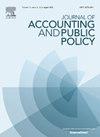Does the tax deductibility of interest affect financial reporting?
IF 2.2
3区 管理学
Q1 BUSINESS, FINANCE
引用次数: 0
Abstract
Many countries have imposed tax policies that limit interest deductions to specified leverage ratios to fight aggressive income shifting and to achieve other public policy goals. Implementing these thin capitalization tax rules reduces the incentives to use debt unrelated to the relation between the firm and its debtholders. We posit that, as a result of the effect of the rules on debt levels, firms subject to these rules reduce their conservative financial reporting as compared to other firms in these countries. Tests employ a large sample of firms in OECD countries who introduced thin capitalization rules from 1985 to 2014, and a second sample of U.S. firms around the implementation of earnings-based interest limits under the Tax Cuts and Jobs Act. Exploiting these two settings and difference-in-differences research designs, we provide evidence that the adoption of tax deductibility limits reduces conditional conservatism of firms’ financial reporting. Our findings suggest that the tax rules affecting the deductibility of interest have important impacts on corporate financial reporting and may also have unintended consequences for other decisions of interest to policy makers.
利息的可抵税性是否影响财务报告?
许多国家实施了税收政策,将利息扣除限制在特定的杠杆比率,以打击激进的收入转移,并实现其他公共政策目标。实施这些稀薄的资本化税收规则减少了使用与公司与其债权人之间关系无关的债务的动机。我们假设,由于规则对债务水平的影响,与这些国家的其他公司相比,受这些规则约束的公司减少了其保守的财务报告。测试采用了经合组织国家的大样本公司,这些公司在1985年至2014年期间引入了薄资本化规则,另一个样本是根据《减税和就业法案》实施基于收益的利息限制的美国公司。利用这两种设置和差异中的差异研究设计,我们提供证据表明,采用税收抵扣限制降低了公司财务报告的条件保守性。我们的研究结果表明,影响利息扣除的税收规则对公司财务报告有重要影响,也可能对政策制定者的其他利益决策产生意想不到的后果。
本文章由计算机程序翻译,如有差异,请以英文原文为准。
求助全文
约1分钟内获得全文
求助全文
来源期刊

Journal of Accounting and Public Policy
Multiple-
CiteScore
4.80
自引率
2.80%
发文量
75
期刊介绍:
The Journal of Accounting and Public Policy publishes research papers focusing on the intersection between accounting and public policy. Preference is given to papers illuminating through theoretical or empirical analysis, the effects of accounting on public policy and vice-versa. Subjects treated in this journal include the interface of accounting with economics, political science, sociology, or law. The Journal includes a section entitled Accounting Letters. This section publishes short research articles that should not exceed approximately 3,000 words. The objective of this section is to facilitate the rapid dissemination of important accounting research. Accordingly, articles submitted to this section will be reviewed within fours weeks of receipt, revisions will be limited to one, and publication will occur within four months of acceptance.
 求助内容:
求助内容: 应助结果提醒方式:
应助结果提醒方式:


